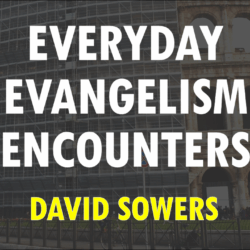This is part six of a series of posts called Habits of a Disciple.
It was a warm sunny day when Sal, Jaired, and I went to Washington Park in Albany looking for someone to talk to about the gospel. It was Sal’s turn. He had watched me talk to some folks, but now he was going to give it a try. He spotted a middle-aged African American man sitting at a picnic table by himself. I was on camera and Jaired was observing. Sal asked the man if he would help him out by answering a few questions about the afterlife. The man’s name was Will.
Sal launched into a series of questions designed to make Will think about his life and what would ultimately happen to him on judgment day. In the course of the conversation Will opened up and told us that he had struggled with a crack addiction for years. He had just gotten out of a rehab and he was sitting in the park trying to figure out his life. Of course Will had already heard what Jesus had done for him before, but he had not turned his life over to him. Sal, then only fifteen years old, looked at Will with earnestness and said, “I think you can change.”
After a while, Sal invited Will to come to church and gave him his own phone number, a fact that greatly impressed Will. That Sunday Will came to church with his girlfriend. He came late and left early, but not before hearing the sermon. He shook my hand as he left, muttering an apology about having to go before the service fully ended. I never saw him again.
Several weeks later I got a strange call from a woman with a shaky voice. She was obviously upset and I had no idea why. She asked me, “I heard there’s a tape of Will.” It sounded like she was angry that we had videotaped our encounter with Will. I sheepishly affirmed her inquiry. She sounded relieved and then went on to tell me that just a couple of days earlier Will had died. They were watching a movie together when suddenly his chest began hurting. By the time the ambulance got there, he was already dead. She said she wanted a copy of the tape. I told her I’d make her a DVD. She came in and got it.
She called one more time, her voice again full of emotion, and thanked me profusely. She said that Will called Sal his angel. I could see why. Here was this fifteen year-old with long flowing locks of blond hair gleaming in the sun that boldly relayed a wakeup call from God Almighty with sincerity and purity of heart at just the moment he needed to hear it. Of course, Sal is no angel, then or now. Honestly, his presentation wasn’t even that good. He stuttered a few times and was pretty awkward. But, none of that mattered. God worked through Sal to give a dying man what he needed to hear just when he needed to hear it most. It was an evangelism encounter none of us will ever forget.
I’ve studied evangelism for more than a dozen years. I’ve analyzed every time Jesus preached in the Gospels, scrutinized all of the sermons in the book of Acts, and carefully examined all of the usages of the relevant Greek words. I’ve read quite a few books on the subject from widely different perspectives. I’ve taught classes on evangelism, not only at Living Hope in New York, but also in Indiana and Georgia. I’ve spoken one on one with dozens and dozens of individuals up and down East Coast and over in Midwest. In all my learning and experience, I’ve come to see one key to evangelism above all the others. It’s not what technique you use or whether you bring a bible or not. Your age doesn’t matter nor your location, looks, intelligence, or preparedness. One simple factor matters far, far beyond all the rest—courage.
I’m convinced that courage may account for as much as 90% of evangelism. If you have the courage to simply open your mouth and talk to someone, whether a friend or a stranger, you will be done with most of the battle. In fact, the greatest fight in evangelism is not figuring out what to say, where to go, or whom to speak to, but overcoming the objections that pop up in your own head. You have to fight your own fears. What if they reject me? What if they make fun of me? What if they beat me up? What if they ask me a question I don’t know how to answer? What if I don’t make sense? What if I look stupid? What if I forget what to say? What if I can’t start the conversation? What if I say the wrong thing? Now, some of these are valid concerns, but you can’t let them stop you. It’s true that if you’ve never shared your faith with anyone before, then it probably will be awkward. You probably won’t have the perfect starting line or the best answer to every question and objection they bring up. That is alright. It is ok not to be an evangelist superstar. It is ok to say, “I don’t know” and get back to them. It’s ok to look stupid. It’s ok to suffer for Christ; Jesus said to rejoice in that day for in such a way they treated the prophets of old (Luke 6.22-23).
None of our rationalizations or excuses changes the fact that Christ’s last words to his followers were to go make disciples (Matthew 28.19-20). So what should we do? Should we cower in fear? Should we allow our concerns to paralyze us? Should we hide our lamp under a basket? No! Let’s just do it anyhow. (If you would like training in what the message is and a method for talking to people, then take a look at this Evangelism Class)
Have you ever wondered how much the twelve knew when Jesus sent them out? Had he given them a seminar on evangelism? Did they use a technique? He sent them out and gave them some pretty basic instructions: preach to the lost sheep of Israel, proclaim, “The kingdom of heaven is at hand,” heal the sick, take no money or provisions, stay with people, leave if they won’t receive you, etc. Then he spent the rest of the time telling them about how much they were going to suffer. Here’s some of what he said:
Matthew 10.16-18, 21-22, 24-26, 32-33
16 “Behold, I am sending you out as sheep in the midst of wolves, so be wise as serpents and innocent as doves. 17 Beware of men, for they will deliver you over to courts and flog you in their synagogues, 18 and you will be dragged before governors and kings for my sake, to bear witness before them and the Gentiles…21 Brother will deliver brother over to death, and the father his child, and children will rise against parents and have them put to death, 22 and you will be hated by all for my name’s sake. But the one who endures to the end will be saved…24 “A disciple is not above his teacher, nor a servant above his master. 25 …If they have called the master of the house Beelzebul, how much more will they malign those of his household. 26 “So have no fear of them, for nothing is covered that will not be revealed, or hidden that will not be known…32 So everyone who acknowledges me before men, I also will acknowledge before my Father who is in heaven, 33 but whoever denies me before men, I also will deny before my Father who is in heaven.
I would prefer the image sheep among goats or an eagle among vultures, but not sheep among wolves! This is the first time Jesus ever sent out anyone to do evangelism and he calls them sheep among wolves. There aren’t any cute pictures of this in children’s bibles. I don’t like to think of myself as a sheep sent out from my protective little sheepfold to sojourn among ravenous wolves. Wolves eat sheep! But it gets worse. Jesus drops the metaphor and tells them straight out that they are going to get arrested and beaten, not only from outsiders, but also from their closest family members. If they insulted and mocked Jesus (the master) then, of course, they will do the same to his household. Read all of Jesus’ “pep talk” in Matthew chapter ten some time. It’s not the “ra ra, let’s go get ‘em” speech I would have given, but it worked! This rag-tag motley crew would go on to ignite a movement that spread around the globe to such a degree that twenty centuries later, nearly one out of every three people on the planet identifies as a Christian, making Christianity the world’s biggest religion with 2.2 billion adherents. They faced their fears and they went out and spread the word. Many of the first generation Christ-followers lost their lives, but they thought it was worth it. What about us? What about you? Today is our time. This is our generation. Will we share the life-changing, salvific message with the lost, regardless of the cost?
Read part seven: Giving







